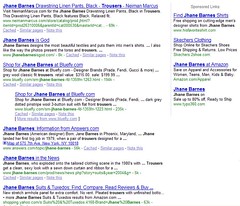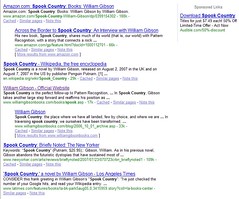Should you buy search ads for your brand keywords?
I confess, as a search engine optimizer, I used to think that buying ads for one’s own brand name was a complete waste of money. After all, all companies should rank in top slots for their own brand name(s), if they’re doing their SEO right, and if you’re ranking tops then people will be able to find you if they’re looking for you. As such, I thought that buying ads for your own name was just paying for clicks that should rightly come to you anyway.
But over time, I’ve heard other experts stating that their research shows that having ad presence for brands along with natural search ranking appears to enhance overall click through rates in a synergistic manner. And, with greater experience, I’ve seen a number of cases when companies really should be buying their own brand name keywords for ads!
I see that George Michie over at the Rimm-Kaufman Group criticized a recent Microsoft study claiming that some advertisers are wasting money by buying their own brands in paid search ads — and I think George was right to criticize this. Read on and I’ll elaborate…
I’ve seen a lot of cases where companies frequently don’t rank well for some of their brand-name combinations. Sure, one can argue that if their natural search optimization were done better, they might rank at the very top of the SERPs for those combos. But, I see cases where quite a few companies have products that are more typically purchased through particular department stores, resellers, or other distributors, and those other companies may have so much better search rankings that the original product creator is not likely to ever rank above them.
In these cases, I think that buying one’s own brand names in paid search makes a lot of sense!
For example, I love these Jhane Barnes clothes I can get at high-end department stores like Nordstroms — if you do a search for “Jhane Barnes trousers”, you get a search results page where the official Jhane Barnes site is only listed in the sixth position down:
Now, I know that it’s likely that most of the Jhane Barnes sales likely happen in department stores, so it’s maybe not upsetting to them that they’re ranking lower than Neiman Marcus. Quite simply, Jhane Barnes (PageRank = 5) is not likely to ever outrank much more widely popular sites like Neiman Marcus (PageRank = 6) or Bluefly.com (PageRank = 6). Even if Jhane Barnes were to fix all of the SEO flubs that I see going on with their site, I’m not at all sure that they would overtake the Neiman Marcus or Bluefly pages that I see outranking them on that longer-tail search combination.
I’d bet that Jhane Barnes would make more money selling directly to consumers than selling through these distributors, though, and getting position higher on the SERPs would help with that. A paid search ad for their brand name would help insure they’d get up there. And, as a consumer, if I rapidly saw their official site when I came to this SERP, I might be inclined to click through to check their prices first, in the assumption that they might have just a slightly lower price than Neiman’s for the same item, or I might get discount offers from the later on.
Let’s look at an even more dramatic example, though. Let’s do a search for William Gibson’s newest book, “Spook Country”:
Notice how the highest couple of links in the SERP is to the book’s pages at Amazon.com? The next is Wikipedia. The next two are, thankfully, the author’s own site. The two after that are to magazine and news sites, and so on. Now, you can buy the book through the author’s site, but it just has links off to other places like Amazon and Barnes & Noble to buy the book. But, how about the big publisher who manufactured and promoted the book?!?
Putnam Adult, the imprint of the book, is owned by the Penguin Group USA, the publisher. They’ve got their own online shop where this book could be purchased, assumably at higher profit for Penguin than if the book is bought through distributor book shops. The Penguin Group’s listing for Spook Country is all the way on the second page of the search results in Google — a place where practically no consumer is going to click to buy.
The Penguin Group USA website has a Google Toolbar PageRank of 7, but their pages are not likely to ever outrank the internet behemoths of Amazon.com (PageRank = 9) nor Wikipedia (PageRank = 9). They might even have considerable struggle with getting above The New Yorker (PageRank = 8), and The Los Angeles Times (PageRank = 8).
The best way to ensure that The Penguin Group’s page selling their own book makes it into the field of vision for online consumers would be to buy the keywords for “Spook Country” and “William Gibson” – ads in the sidebar or above the natural search results would undoubtedly drive up their direct sales, reducing how much they’d pay to the distributors.
Of course, to have me, a dyed-in-the-wool natural search expert endorse paid search may invite all sorts of criticism! I used to hear the paid search reps touting branded keywords as enhancing overall click-through, though, and I couldn’t help but be suspicious of their motives, since they have an obviously vested interest in increasing paid search purchases. However, I think that there are objectively logical reasons for using paid search placement for brand keywords, just like the examples shown above, and I think that there could indeed be a positive psychological effect on brand recognition when both natural and paid search placements appear on the same page. At very least, if you’re in both, you’re taking up more of the page’s overall real estate, reducing the space taken up by other parties.
I believe that a strong search marketing program has both paid and natural presence.
So, George Michie is right, though I don’t know that I’d go so far as to call affiliates “thieves” 🙂 , since affiliates are frequently more facile, quick and efficient at targeting market niches that the bigger, product-originating companies have difficulty in catering to.
Possible Related Posts
Posted by Chris of Silvery on 08/24/2007
Permalink | |  Print
| Trackback | Comments Off on Should you buy search ads for your brand keywords? | Comments RSS
Print
| Trackback | Comments Off on Should you buy search ads for your brand keywords? | Comments RSS
Filed under: Advertising, brand names, Monetization of Search, Paid Search Atlas-Study, brand names, brand-ppc, brand-search, Microsoft-Ads, Paid Search, paid-vs-natural, Pay-Per-Click, ppc




No comments for Should you buy search ads for your brand keywords?
No comments yet.
Sorry, the comment form is closed at this time.